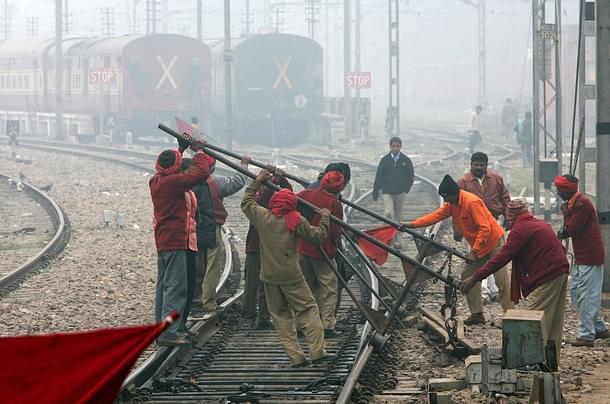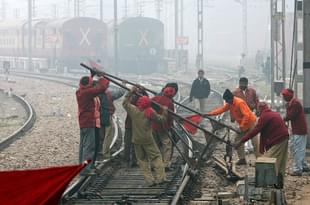Economy
Indian Railways Is Stepping Up Maintenance By Emulating Mumbai’s ‘Track’ Record
Sindhu Bhattacharya
Jun 19, 2018, 12:43 PM | Updated 12:43 PM IST
Save & read from anywhere!
Bookmark stories for easy access on any device or the Swarajya app.


Taking a leaf out of the Mumbai suburban train service schedules, the Indian Railways (IR) is now lining up mega maintenance blocks on Sundays. Maintenance blocks are time periods when no train movement is allowed on a certain stretch of track, so that essential maintenance and upgradation activities can be undertaken. This, however, results in train delays. The Mumbai suburban network is shut down every day for about three hours and for almost six hours on Sundays to allow for maintenance activities without disruption of services. This model will now be emulated across the entire railway network, Railways Minister Piyush Goyal said on Monday (18 June).
A timetable will surely help the beleaguered IR improve its worsening delays, with network-wide punctuality pegged at 58 per cent just 10 days ago. This means that almost every second train was getting delayed until the beginning of June. Railway officials now claim that due to several measures undertaken since then, the network-wide figure has improved to 68 per cent within just these 10 days. This still means almost every third train is delayed. Will there be a similar dramatic improvement in train punctuality with all the new measures Goyal is putting in place? This remains to be seen.
During mid-May, 59 per cent of mail/express trains running in the East Central Railway Zone were delayed. This means only four in 10 such trains in the zone arrived on time. More than a 100 mail/express trains are being delayed on an average every day, by anywhere between 12-18 hours. Compared to the same period last year, train delays have become much worse since on-time arrival in mid-May last year for mail/express trains was 78 per cent.
This is the status of more than a 100 passenger trains which the railways says have been ‘rescheduled’ as of Monday morning, while scores of others are cancelled and diverted. Remember, train cancellations often happen because of inordinate delays, though other reasons can also cause cancellations.
In this context, minister Goyal’s attempts at democratising maintenance blocks could make some positive impact. Goyal said that not only will there be daily two-hour blocks with prior notice to passengers, Sundays will see five-hour blocks and delayed passengers will get meals for free. Of course, this free meal facility is only for passengers with reservations. Remember, 63 paise of every rupee the IR earns from its passenger business comes from those who have prior tickets. But in terms of numbers, they account for only about six per cent. Obviously then, an overwhelming number of passengers will not get free food and water even if trains are delayed under the new plan. But Goyal has promised real-time train status updates to all, so they can plan journeys better. And this should be a big relief.
Goyal said this arrangement of planned track maintenance will continue for at least six months. Continuing with this endeavour, the minister also announced that a tertiary line has been sanctioned for the choked Mughalsarai-Allahabad section at a cost of Rs 2,000 crore. It will take three years to complete and ease congestion considerably. The track renewal target for 2018-19 is about 5,000 km, and if it is achieved, 70 per cent of overdue maintenance works would have been completed and trains speeded up.
Before Monday’s announcement on planned maintenance blocks, the railways had been banking on partial opening of the much-awaited dedicated freight corridors – two stretches of 400 km each – later this year, which were to take some portion of the goods’ train traffic away from existing, choked rail tracks and ease up passenger traffic. Railways officials were saying that with a stiff track maintenance target set out for this fiscal, perhaps delays due to maintenance works will also reduce next fiscal.
The IR is currently choked, with demand far outstripping capacity on many sections and this leads to delays as well. Sample this: the railways operates on 1,200 sections in all, of which 800 have already been saturated beyond capacity. Almost 400 of these sections are saturated up to 150 per cent of capacity, another 400 are 100 per cent used. The busiest rail route in the country is the Mughalsarai-Ghaziabad section, where capacity is 68 trains each way. But the IR is already operating 50 passenger and 45 goods trains on this section, each way. Just six rail routes: Delhi-Mumbai, Mumbai-Chennai, Chennai-Kolkata, Kolkata-Delhi, Delhi-Chennai and Kolkata-Mumbai account for almost 60 per cent of the railways’ total traffic but use only 16 per cent of route kilometres.
Adding to the capacity woes is the railway’s new resolve on track maintenance to improve safety. After deadly accidents last year and the recent one on an unmanned level crossing in Uttar Pradesh, where more than a dozen children perished, the railways has been setting up stiff track renewal targets as well as targets for closing such unmanned crossings. This, of course, delays trains further.
Block hours jumped almost by one-fifth last fiscal compared to 2016-17, and the target for maintenance remains at this level even for 2018-19. Speed restrictions also more than doubled to 4,000 locations in 2017-18 compared to the previous fiscal and are targeted at the same level in 2018-19 as well. With all railway zones now pledging to do coordinated and well-advertised maintenance closures, perhaps, network wide punctuality will improve.
Sindhu Bhattacharya is a senior journalist.





